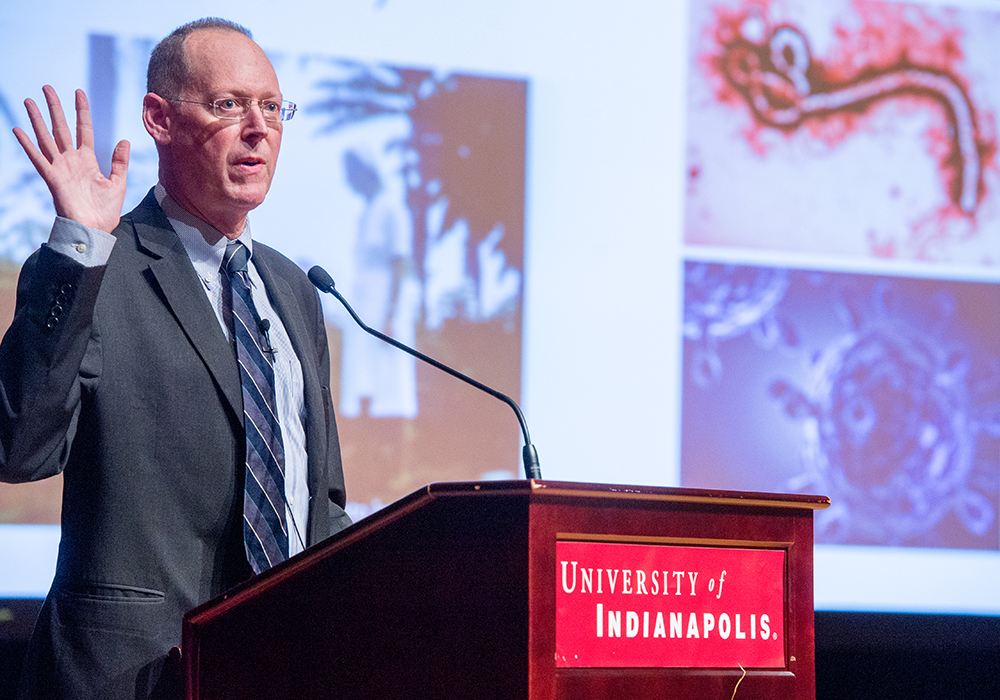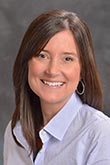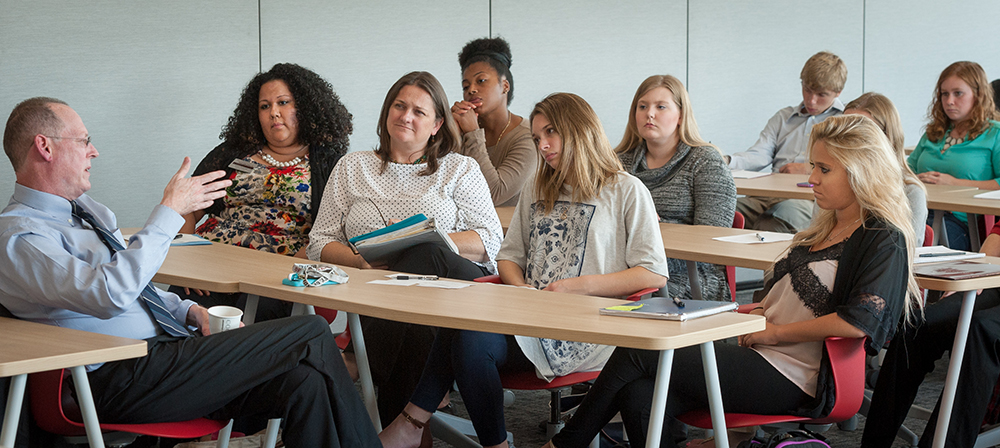Activist doctor takes aim at global health care
 Physician and international health activist Paul Farmer addresses the audience Tuesday at UIndy’s Christel DeHaan Fine Arts Center. His talk was presented by the University Series and the Blanche E. Penrod Lecture Series.
Physician and international health activist Paul Farmer addresses the audience Tuesday at UIndy’s Christel DeHaan Fine Arts Center. His talk was presented by the University Series and the Blanche E. Penrod Lecture Series.
Dr. Paul Farmer speaks with dry wit and humble humor as he rattles off statistics from the world’s major infectious disease outbreaks.
“I know all this stuff because I’m a nerd,” the globetrotting physician-anthropologist said Tuesday night at UIndy’s Christel DeHaan Fine Arts Center.
But the stories he tells from his work in West Africa, Haiti and elsewhere are chilling, and the questions he poses are troubling: Why did the Marburg virus kill only 22 percent of the people who contracted it in Germany, but 90 percent of those it touched in Angola? Why did all 11 Americans who contracted Ebola last year survive, while thousands died in West Africa? And why did he lose friends and colleagues — trained medical professionals — to Ebola?
The answer is simple, according to Farmer, subject of the best-selling 2003 biography Mountains Beyond Mountains: The Quest of Paul Farmer, a Man Who Would Cure the World. His talk was part of this year’s University Series, which also will host Mountains author Tracy Kidder on Nov. 12.
In many developing nations, the personnel, supplies and facilities required for even basic public health care – the “staff, stuff and space,” in his parlance – are simply missing.
In West Africa, for example, where Farmer worked last year while others fled the Ebola outbreak, many so-called Ebola treatment units were merely abandoned buildings where victims were quarantined without beds, care or even sufficient fluids to stay hydrated. The solutions to such problems are painfully obvious, and in terms of global aid dollars, the investment needed to fund significant improvements is relatively small.
“You don’t even have to waste too much time on a needs assessment. … It’s really about money and political will,” said Farmer, who chairs the Department of Global Health and Social Medicine at Harvard Medical School. “If you think doctors are important to health care, they don’t have those. They don’t have a lot of nurses, either. And they don’t have managers – oh, and they don’t have electricity and water in the facilities. And it goes on and on. So we’ve got a lot to do, but none of it is rocket science.”
Developing nations tend to have fragile health care delivery systems that crumble in the face of epidemics and natural disasters. Ebola is a “caregiver’s disease,” Farmer said, spreading quickly from the initial victims to their family members and then through the already sparse medical community because of the poor general conditions. In the case of the 2010 Haiti earthquake, the Ministry of Health building was among many government buildings destroyed, crippling local response efforts.
When the industrialized world responds to such events with charity efforts, the money often comes late, fails to reach the neediest recipients and seldom goes toward the reinforcement of basic health care systems for the long term, he said.
That’s why Partners in Health, the international organization Farmer cofounded and serves as chief strategist, focused its Haiti response on establishing a teaching hospital where tomorrow’s health care professionals are being trained. University Hospital in central Haiti now employs hundreds of staffers, nurses and doctors to see more than 700 patients each day, most of whom had little or no previous access to health and wellness care.

Farmer, who has written extensively about “health care as a human right,” was introduced to the stage by Dr. Alyson O’Daniel, an assistant professor of Anthropology who studies health-related issues in society. She said his books have been an inspiration in her own career.
“His work introduced me to how social inequality gets under the skin,” she said.
Farmer clearly enjoyed sharing his message on campus. On Tuesday afternoon, he spent a solid hour talking and answering questions from a select group of students at the UIndy Health Pavilion, home of the university’s allied health disciplines and Master of Public Health program.
After his presentation, Farmer took questions from the audience for more than an hour before heading to the lobby to sign books.
“I’m going to hang around outside,” he told the crowd. “I’m just getting warmed up.
 Farmer chats with a select group of students during a private session Tuesday afternoon at the UIndy Health Pavilion.
Farmer chats with a select group of students during a private session Tuesday afternoon at the UIndy Health Pavilion.
